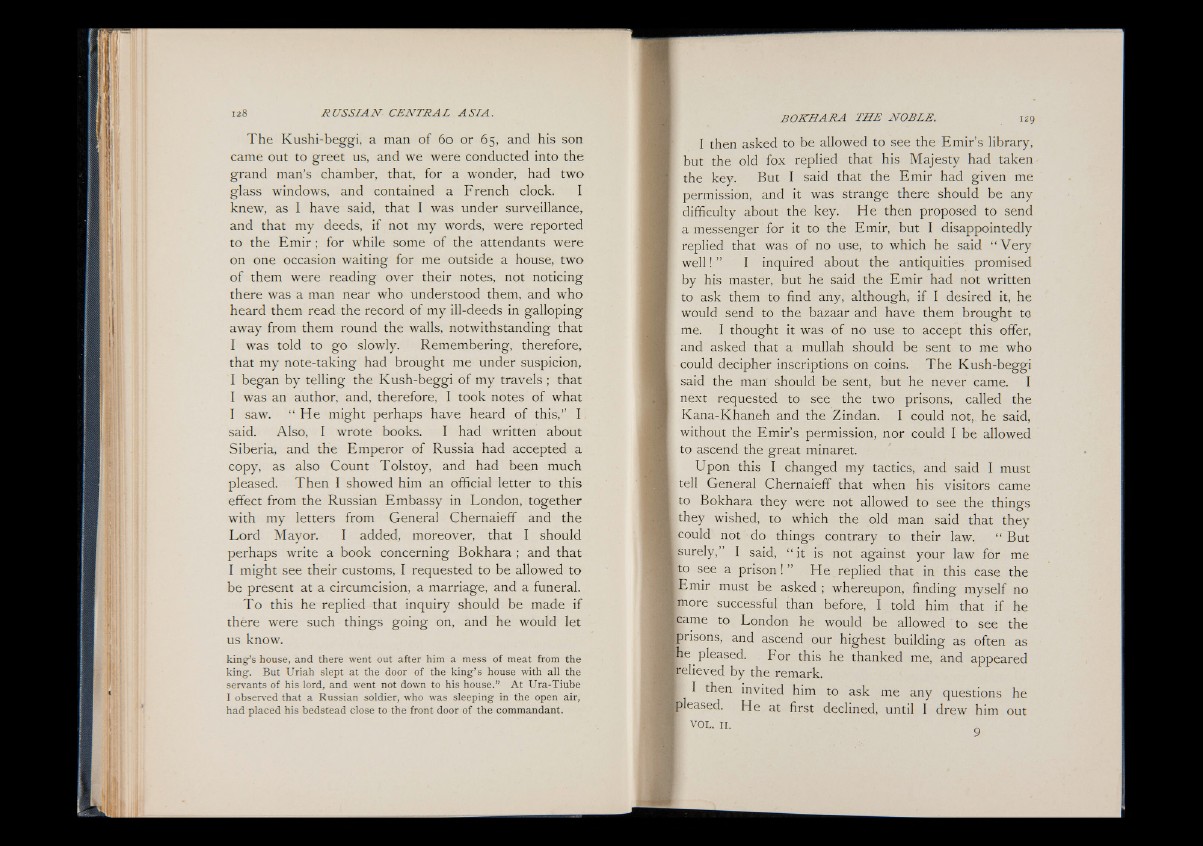
The Kushi-beggi, a man of 60 or 65, and his son
came out to greet us, and we were conducted into the
grand man’s chamber, that, for a wonder, had two
Sflass windows, and contained a French clock. I
knew, as I have said, that I was under surveillance,
and that my deeds, if not my words, were reported
to the Em ir ; for while some of the attendants were
on one occasion waiting for me outside a house, two
o f them were reading over their notes, not noticing
there was a man near who understood them, and who
heard them read the record of my ill-deeds in galloping
away from them round the walls, notwithstanding that
I was told to go slowly. Remembering, therefore,
that my note-taking had brought me under suspicion,
I began by telling the Kush-beggi of my travels ; that
I was an author, and, therefore, I took notes of what
I saw. “ He might perhaps have heard of this,” I
said. Also, I wrote books. I had written about
Siberia, and the Emperor of Russia had accepted a
copy, as also Count Tolstoy, and had been much
pleased. Then I showed him an official letter to this
effect from the Russian Embassy in London, together
with my letters from General Chernaieff and the
Lord Mayor. I added, moreover, that I should
perhaps write a book concerning Bokhara ; and that
I might see their customs, I requested to be allowed to
be present at a circumcision, a marriage, and a funeral.
T o this he replied that inquiry should be made if
there were such things going on, and he would let
us know.
king’s house, and there went out after him a mess of meat from the
king. But Uriah slept at the door of the king’s house with all the
servants of his lord, and went not down to his house.” At Ura-Tiube
I observed that a Russian soldier, who was sleeping in the open air,
had placed his bedstead close to the front door of the commandant.
I then asked to be allowed to see the Emir’s library,
but the old fox replied that his Majesty had taken
the key. But I said that the Emir had given me
permission, and it was strange there should be any
difficulty about the key. He then proposed to send
a messenger for it to the Emir, but I disappointedly
replied that was of no use, to which he said “ Very
w e ll! ” I inquired about the antiquities promised
by his master, but he said the Emir had not written
to ask them to find any, although, if I desired it, he
would send to the bazaar and have them brought to
me. I thought it was of no use to accept this offer,
and asked that a mullah should be sent to me who
could decipher inscriptions on coins. The Kush-beggi
said the man should be sent, but he never came. I
next requested to see the two prisons, called the
Kana-Khaneh and the Zindan. I could not, he said,
without the Emir’s permission, nor could I be allowed
to ascend the great minaret.
Upon this I changed my tactics, and said I must
tell General Chernaieff that when his visitors came
to Bokhara they were not allowed to see the things
, they wished, to which the old man said that they
I could not do things contrary to their law. “ But
[surely,” I said, “ it is not against your law for me
[to.see a prison!” He replied that in this case the
Em ir must be asked ; whereupon, finding myself no
[more successful than before, I told him that if he
pame to London he would be allowed to see the
.prisons, and ascend our highest building as often as
• e pleased. For this he thanked me, and appeared
[relieved by the remark.
B I then invited him to ask me any questions he
pleased. He at first declined, until I drew him out
I v o l . 11. 9